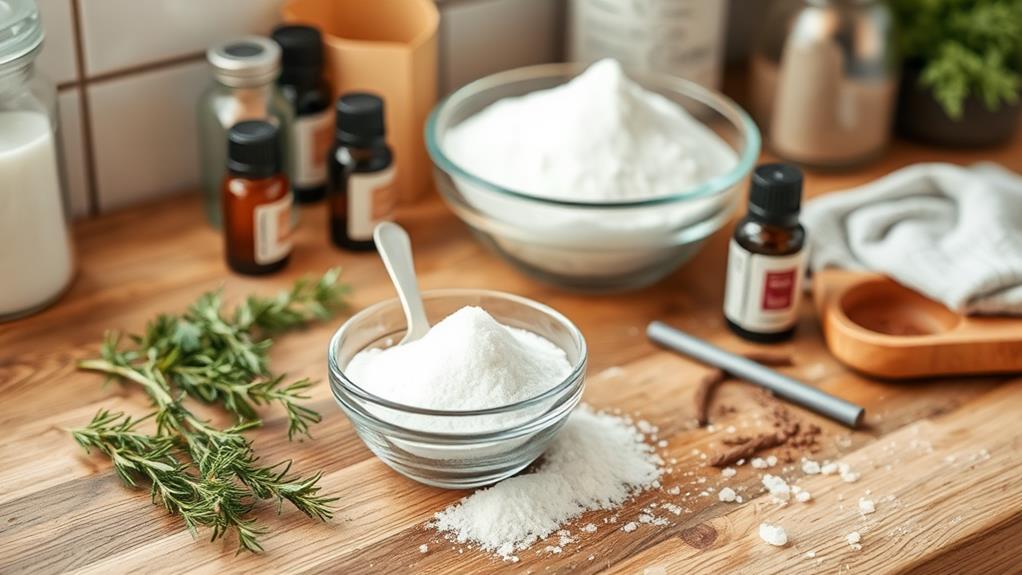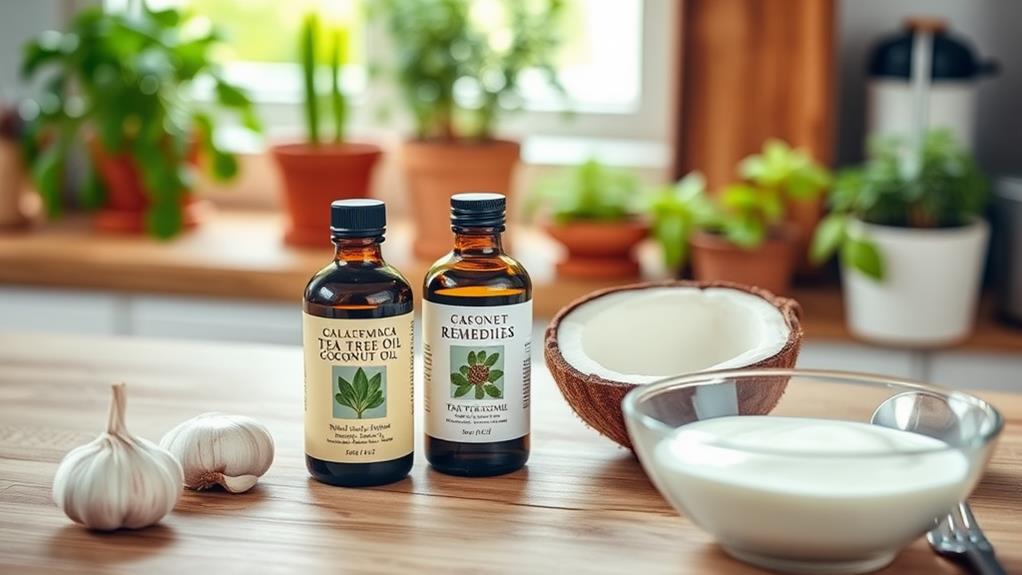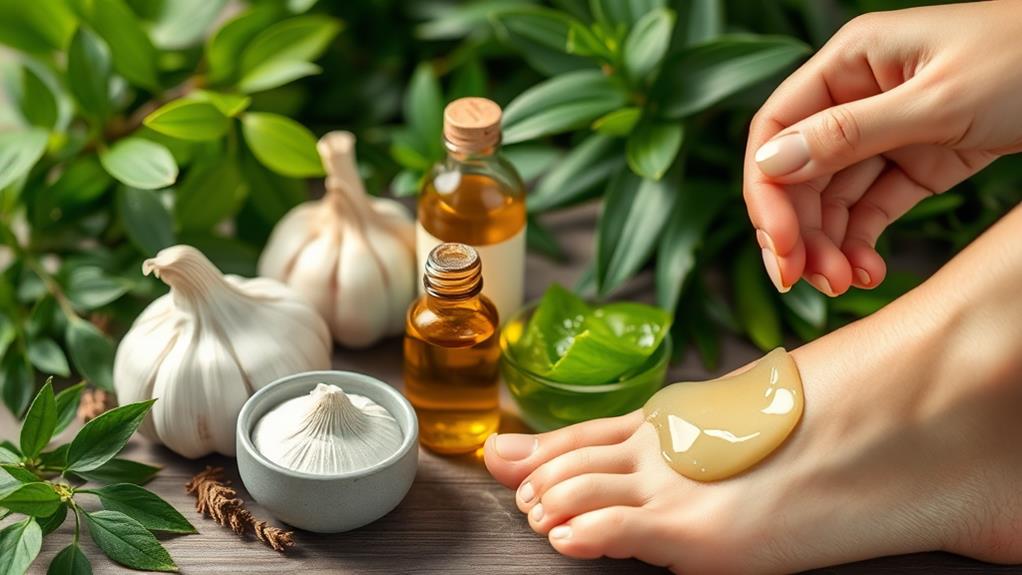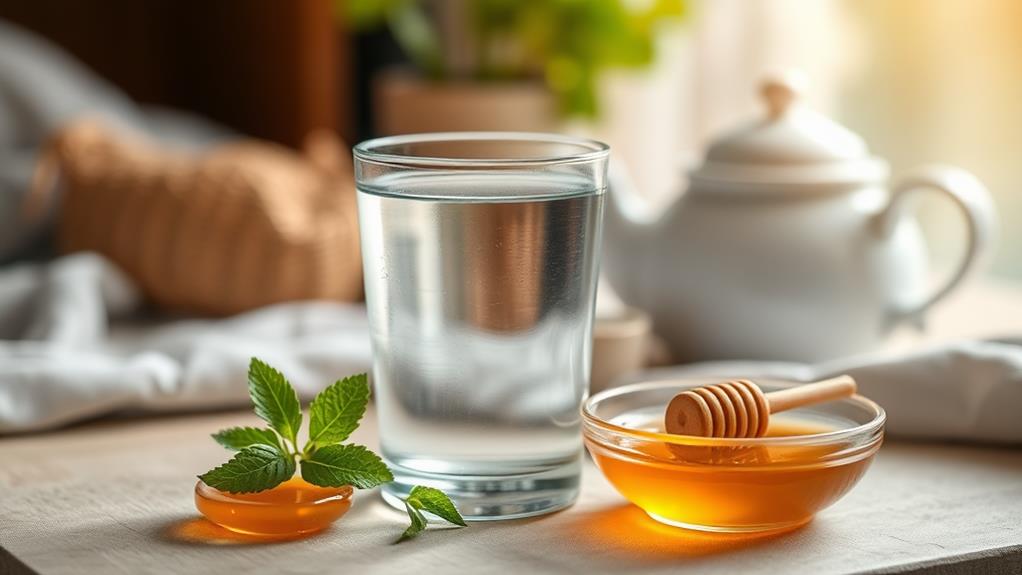Fungal infections can be a persistent nuisance, but you don't have to resign yourself to discomfort. You can explore effective remedies like tea tree oil and garlic, which harness natural antifungal properties. Additionally, understanding prevention strategies is just as crucial. By incorporating simple practices into your routine, you can significantly reduce your risk. Curious about the specific remedies and tips that can help you manage and prevent these infections? Let's uncover the details that could make a difference in your health.
Key Takeaways
- Use essential oils like tea tree and oregano oil mixed with a carrier oil for effective topical antifungal treatment.
- Incorporate natural foods such as garlic and coconut oil into your diet for their antifungal properties and immune support.
- Apply apple cider vinegar diluted with water to affected areas to create an unfavorable environment for fungi.
- Maintain good hygiene by regularly washing hands and keeping skin dry and clean to prevent fungal infections.
- Avoid sharing personal items and use protective footwear in public areas to reduce exposure to fungal spores.
Tea Tree Oil

Many people turn to tea tree oil for its potent antifungal properties. If you're dealing with pesky fungal infections, this natural oil could be your new best friend! It's extracted from the leaves of the tea tree, which is native to Australia. People have been using it for ages, and it's known for fighting off those annoying fungi.
Using tea tree oil is pretty simple. You can mix a few drops with a carrier oil, like coconut or olive oil, and apply it directly to the affected area. Just be sure to do a patch test first; nobody wants a surprise reaction! You might feel a slight tingling, which usually means it's working.
You can also add a few drops to your bath for an all-over fungal-fighting experience.
And don't worry, it smells much better than you'd think! It's a refreshing change from some other remedies that might leave you holding your nose.
Garlic
Garlic is another powerful ally in the fight against fungal infections. You might love the smell of garlic in your favorite pasta dish, but did you know it's also a natural fighter against fungus?
Garlic contains a compound called allicin, which has antifungal properties. This means it can help keep those pesky fungal invaders at bay.
You can use garlic in a couple of ways. First, try adding it to your meals. Cooking with fresh garlic not only adds flavor but can also boost your health!
If you're feeling brave, you could even apply crushed garlic directly to the affected area for a more targeted approach. Just be careful; it might sting a bit, so don't leave it on for too long.
Coconut Oil

Coconut oil is a versatile remedy that's gaining popularity for its effectiveness against fungal infections. It's like nature's little miracle worker!
This oil contains medium-chain fatty acids, which have antifungal properties that can help zap those pesky fungi. You can use coconut oil topically on your skin, especially in areas prone to infections. Just apply a small amount to the affected area and gently massage it in.
Not only does it fight fungi, but it also moisturizes your skin, leaving it feeling soft and smooth. Who doesn't love that?
Plus, it has a delightful coconut scent, making it a treat for your senses while you tackle those annoying infections.
If you're feeling adventurous, you can even incorporate coconut oil into your cooking! It's a healthy fat that can support your overall well-being, which is a win-win.
Just remember to use it consistently to see the best results.
Apple Cider Vinegar
When it comes to natural remedies for fungal infections, apple cider vinegar stands out as a powerful option. This tangy liquid isn't just for salad dressings; it's been used for ages to tackle pesky fungi. You can easily add it to your routine!
To use apple cider vinegar, mix equal parts with water and apply it to the affected area using a cotton ball. It might sting a little, but that's just the vinegar doing its job!
You can also drink a tablespoon diluted in a glass of water daily to help boost your body's defenses. Just remember, too much of a good thing can be, well, too much—so don't overdo it!
The acetic acid in apple cider vinegar helps create an environment that fungi just can't stand. Plus, it's packed with vitamins and minerals that support your overall health.
It's like having a mini health party in a bottle!
Aloe Vera

Harness the soothing properties of aloe vera to combat fungal infections effectively. This amazing plant isn't just for sunburns; it's also a fantastic remedy for your skin troubles!
When you apply fresh aloe vera gel directly to the affected area, it can help cool irritation and reduce inflammation, making it a great ally in your fight against fungi.
To use aloe vera, simply cut a leaf from the plant, scoop out the clear gel, and gently spread it over the infected area. You'll feel the refreshing sensation as it starts working its magic. Plus, aloe vera has natural antifungal properties, which means it isn't just a pretty face—it's actively fighting off those pesky fungi!
Make sure to use pure aloe vera, as some products can have added ingredients that might irritate your skin further. If you don't have a plant at home, you can find aloe vera gel at health stores, just check the label for purity.
Yogurt
Many people don't realize that yogurt can be a powerful ally in the battle against fungal infections. It's not just a tasty snack; it's loaded with probiotics, those helpful bacteria that keep your gut healthy and your immune system strong. When your body's defenses are up, it can better fight off pesky fungal invaders.
You can enjoy yogurt in a few ways. First, try eating plain, unsweetened yogurt regularly to help maintain your gut's balance. You might even mix in some fresh fruit or honey for flavor.
But that's not all! You can also apply yogurt directly to the affected area. Just make sure it's plain yogurt—no added sugars or flavors here. Spread a thin layer, let it sit for about 20 minutes, and then rinse it off. This can soothe irritated skin and create an environment that's less friendly to fungi.
Of course, yogurt isn't a magic potion, but it definitely helps. Pair it with a balanced diet and good hygiene practices, and you'll be on your way to keeping those fungal infections at bay.
Oregano Oil

Oregano oil is a potent natural remedy known for its antifungal properties. It comes from the leaves of the oregano plant, and it's not just for pizza anymore! When you apply oregano oil to affected areas, it can help fight off those pesky fungal infections.
You can use it topically by mixing a few drops of oregano oil with a carrier oil, like coconut or olive oil, to avoid skin irritation. Just remember, a little goes a long way! You don't want to turn into a walking pizza.
If you're looking to boost your immune system, consider taking oregano oil capsules. These can help support your body's defenses against fungi from the inside out.
But, hold on! Always do a patch test first to check for allergies. And don't forget to consult with a healthcare professional before diving in, especially if you're pregnant or nursing.
Incorporating oregano oil into your routine can be a great way to tackle fungal infections naturally. With its strong antifungal qualities, you'll be one step closer to feeling your best!
Turmeric
Turmeric, a vibrant yellow spice, is renowned for its powerful anti-inflammatory and antifungal properties. You might know it from your favorite curry dish, but it's also a superstar when it comes to fighting fungal infections. This spice contains a compound called curcumin, which can help take down those pesky fungi trying to invade your body.
Using turmeric is easy! You can sprinkle it into your meals, mix it into smoothies, or even create a paste for topical use. Just blend turmeric powder with coconut oil or honey, then apply it to the affected area. It's like giving your skin a friendly hug!
But remember, while turmeric works wonders, it's not a magic cure-all. You shouldn't rely on it alone for severe infections. Always check with your doctor if things aren't getting better.
Plus, turmeric can stain your clothes, so be careful when using it in the kitchen!
Incorporating turmeric into your diet is a delicious way to boost your health. So, why not add a little golden goodness to your next meal? Your body will thank you, and who knows, you might just discover a new favorite flavor!
Baking Soda

Baking soda, that trusty white powder sitting in your kitchen, isn't just for baking; it's also a powerful ally against fungal infections. You mightn't have thought about it this way, but it can help keep those pesky fungi at bay.
When you mix baking soda with water, it creates a paste that you can apply to affected areas. This paste can help soothe irritation and reduce fungal growth, making it a simple yet effective home remedy.
To use it, just mix a few tablespoons of baking soda with enough water to form a paste. Apply it to the infected area and let it sit for about 15 to 20 minutes. Rinse it off with warm water, and you're good to go! You can do this once or twice a day until you see improvement.
And let's not forget, baking soda is also great for keeping your feet dry, which is essential in preventing fungi from making themselves at home.
Epsom Salt
If you've ever soaked in a warm bath with Epsom salt, you know how relaxing it can be, but did you know it's also effective for combating fungal infections? That's right! Epsom salt, made from magnesium sulfate, can help when you're dealing with pesky fungi. It works by drawing out moisture, which fungi love to thrive in.
So, if you've got an infection, a soak might be just what you need.
To use Epsom salt for fungal infections, fill your tub with warm water and add about two cups of Epsom salt. Soak for about 15 to 20 minutes, letting the salt work its magic. You'll not only feel relaxed, but you're also giving your body a fighting chance against those stubborn fungi.
Just remember, while Epsom salt can help soothe your skin and may assist in reducing fungal infections, it's not a complete cure. If your infection doesn't improve, it's always a good idea to check with a doctor.
Prevention Tips

To keep fungal infections at bay, it's crucial to stay on top of your hygiene and lifestyle habits.
First, always wash your hands regularly, especially after touching potentially contaminated surfaces. You wouldn't want to bring those pesky fungi home with you, right?
Next, keep your skin dry and clean. Fungi love warm, moist places, so try to wear breathable fabrics, like cotton, especially in hot weather. If you're sweating, change out of those damp clothes ASAP!
Also, remember to avoid sharing personal items, like towels or shoes. It's tempting, but sharing can spread those little troublemakers faster than you think!
If you're a fan of public pools or gyms, wear flip-flops in locker rooms to protect your feet. You never know what might be lurking on the floor.
Lastly, maintain a healthy diet. Eating lots of fruits and veggies helps boost your immune system, making it tougher for fungi to take hold.





